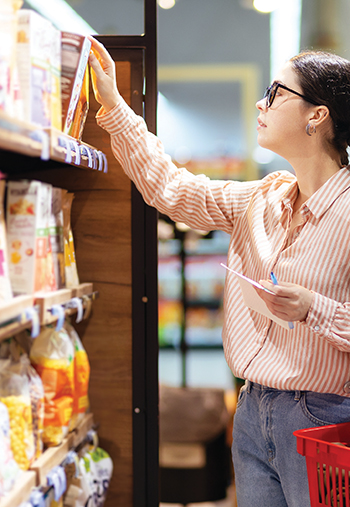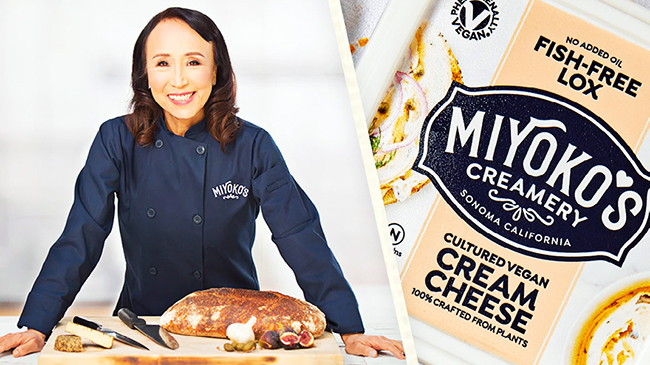NOSHscape: The Latest Food Brand News
Whole Foods Resets Regions, Promises Business As Usual for Brands
Whole Foods Market has redrawn its national footprint and dropped from nine to six total regions to create a new organizational structure that will result in “a more consistent number of stores per region,” the Amazon-owned retailer said.
Though this may change which regions brands are sold in, a spokesperson told NOSH that suppliers will not be impacted when it comes to merchandising or distribution.
The news accompanies an April announcement that the company had laid off team members in its global and regional headquarters.
“We are evolving our operating structure and making adjustments to some corporate teams, so we can better support our stores as Whole Foods Market continues to grow and expand its reach to serve more customers,” the spokesperson said.
According to an internal company memo sent in April, the new structure will divide the retailer’s 500-plus stores across six regions, resulting in “a more consistent number of stores per region.” The company said that the change will not result in any store closures, though it will decrease the number of regional presidents and some roles in regional offices.
Some notable changes include:
The North Atlantic region will include all international stores in Canada and the UK.
California is now its own unified region. The state’s stores were previously split between the Northern California and Southern Pacific regions.
The rest of the Northern California region (which included part of Nevada), the Mountain Pacific and much of the Midwest regions have been combined into a new Central West region — which will include the company’s flagship store in Austin.
The majority of the stores in the former Southwest region, are now in the Southeast region.
In order to adequately staff these larger geographic areas, five regions will have multiple regional offices. For example, the North Atlantic will have staff in Boston, Vancouver, Toronto and London while the Central West will maintain headquarters in Denver, Austin and Seattle.
A spokesperson for Whole Foods Market said the regional realignment will not impact the company’s category review schedule, merchandising plans, or merchandising team, and brands should expect to have continuity in their points of contact.
Brands will also continue to be sold in their existing stores, even if that store is now part of a region that does not currently sell its products. Stores are continuing to place and receive orders from their current distribution centers, the spokesperson confirmed.
Whole Foods Market sources new products using two methods: local foragers and global category managers. The former will remain a vital part of the organization, the spokesperson said, seeking out products from their respective individual regions.
Whole Foods defines a “global” brand as one having products sold in four or more regions, a designation that also requires commitment to a higher promotional spend. Despite the chain consolidating its regions, that point of delineation will remain steady, with the spokesperson noting that any brand sold in multiple regions is already managed by the global team.
The changes to the business come roughly six months after Jason Buechel, Whole Foods’ COO, took on the role of CEO from founder John Mackey, who retired in September 2022. Parent company Amazon has made trimming operations related to its “Stores Business” a core focus for 2023, CEO Andy Jassey said on the company’s fourth quarter earnings call in February. The news accompanies April’s announcement that Whole Foods had laid off team members in its global and regional headquarters.
At Whole Foods, regional and global departments including Team Member Services (TMS), Operations and Supply Chain Management will see their structures change: regional, category-specific store operations, for example, have moved to a new global Field Support team. Global and regional Support Team members were notified if their positions had been eliminated.
“As we simplify processes and improve how we operate, we will be able to quickly respond to evolving business needs, focus more on our most impactful work, and invest in new ways to serve all stakeholders,” the memo stated. “We are confident these changes will allow us to better support our stores, Team Members, and suppliers, elevate the customer experience position Whole Foods Market for continued growth.”
Hershey’s SkinnyPop Adds Manufacturing Muscle Via Copacker Acquisitions
With snacks trending upward and vertically-integrated supply chains becoming increasingly appealing to large corporations amid continued market volatility, The Hershey Company is doubling down on both.
Hershey announced plans in April to acquire two Weaver Popcorn Manufacturing facilities – one in Bethlehem, Pennsylvania and another in Whitestown, Indiana – where its popcorn brand SkinnyPop is currently produced. The deal is still subject to standard regulatory approval and will be financed with cash on hand as well as short term loans, according to a press release. Terms of the deal were not disclosed, but a spokesperson for Weaver noted that the facilities’ current employees will transition to The Hershey Company.
“In response to consumer snacking trends, we continue to evolve our supply chain, making significant investments in the size, scale and capabilities of our network, improving resiliency while we continue to strengthen existing supplier relationships,” said Jason Reiman, chief supply chain officer at The Hershey Company, in a press release.
During the company’s Investor Day presentation in March, Hershey outlined its snack portfolio growth plans, which entails investing in supply chain capabilities and working to scale the operating model. According to its Q4 2022 earnings report, Hershey’s snack set brought in $272 million in net sales that quarter, a 71% increase year-over-year. In 2022, SkinnyPop’s retail sales alone totaled $495 million. According to IRI, U.S. packaged popcorn sales have increased 11.4% to over $2 billion in the past three years.
“Hershey has experienced tremendous growth over the past few years, stemming from a combination of successful strategy execution and an increase in more snacking occasions among consumers,” said Kristen Riggs, president of salty snacks at The Hershey Company, in a press release. “In fact, SkinnyPop has been number one in retail sales growth for ready-to-eat popcorn over the last three years.”
Riggs added that over the next three years, the company would seek to grow gross margin for its salty snacking business by 300 basis points, by utilizing “multiple levers, both commercial and operational.
The confectionary and snacking giant currently owns six candy-focused manufacturing facilities in the U.S. in addition to nine plants located across Asia, South America and Canada. Hershey’s owns over 50 brands including leading snack businesses SkinnyPop, Pirate’s Booty and Dot’s Homestyle Pretzels.
The company has spent the last seven years transitioning from a focus on confection, building a portfolio targeting the broader snack set. In 2017, the chocolate maker acquired Amplify Snack Brands which included SkinnyPop, Paqui tortilla chips and Tyrrells potato chips. Brands under Amplify division have waxed and waned over the years, with SkinnyPop accounting for the majority of the group’s sales. Within the broader company, there have also been moves to increase its snack brand holdings. In 2018 the company bought Pirate’s Booty from B&G Foods, followed a year later by the acquisition of One Brands, maker of protein bar One Bar, for $379 million.
Other recent deals have been aimed in part at improving margins. The company acquired Dot’s in 2021 for $1.2 million alongside the brand’s manufacturing arm, Pretzels Inc., to further expand its salty snacks manufacturing capabilities. During the investor day presentation, Riggs shared that Pretzel’s Inc is also now producing other Hershey’s products, such as Pirate’s Booty.
Her colleague, Will Bonifant, VP of U.S. & Canada Supply Chain, noted in his own presentation that owning manufacturing capabilities would allow the company to also explore innovation where salty snacks could cross over into confection, using a chocolate drizzled popcorn as an example.
“Being able to take products that were outsourced and then insource them, gives us opportunities to expand margin,” Riggs said. “In the long term, there’s more of those supply chain capabilities and opportunities out there.”
FTC Puts Companies on Notice: “Don’t Play Fast & Loose With the Truth”
The Federal Trade Commission (FTC) has warned around 670 companies to stop making unsubstantiated product claims or face the prospect of steep civil penalties.
In April, the agency sent a Notice of Penalty Offenses to the companies, a wide spanning group involved in the marketing of OTC drugs, homeopathic products, dietary supplements and/or functional foods. The list includes retail giant Amazon, pharmaceutical maker Johnson & Johnson, drugstore chains CVS and Walgreens, and wellness influencer Gwenyth Paltrow’s Goop, Inc., among others. Inclusion on the list is not an indication of wrongdoing by the companies named, according to the agency.
Within CPG, the list featured ingredient companies ADM Ganeden and Cargill alongside global conglomerates like Danone, General Mills, Coca-Cola and Pepsi. Other names range from Bragg Live Foods and Brain Juice to Bigelow Tea, POM Wonderful, and Liquid I.V.
The Notice carries the potential for the FTC to incur civil penalties (up to $50,120 per violation) against any company that engages in conduct that it knows has been found unlawful. Such acts include having a lack of a “reasonable basis consisting of competent and reliable evidence” for product claims, lack of “reliable” scientific evidence to support health and safety claims, and at least one “well-controlled human clinical trial” that shows its effectiveness in “curing, mitigating or treating a serious disease.”
Other violations include misrepresenting the level or type of substantiation for a claim and misrepresenting that a product claim has been scientifically or clinically proven.
“The principles behind our substantiation program are simple. If a company makes a claim about what its product can do, it must back that claim up with reliable evidence,” said FTC Commissioner Kelly Slaughter in a statement on March 31. “If a company makes a claim about the health and safety benefits of a product, that claim must be based on scientific evidence. If a company claims that its product can cure, mitigate, or treat a serious disease such as cancer or heart disease, it must back up that claim through the accepted standards of scientific testing, including randomized control trials.”
Reigning in product claims has been a key piece of the FTC’s updated Health Products Compliance Guidance issued in December, which sought to tighten its interpretation of the “competent and reliable scientific evidence” standard. The Notice also represents a newfound willingness by the FTC to deploy its Penalty Offense Authority, which allows it to seek civil penalties if it can be proven that a company engaged in unfair or deceptive practices in violation of the FTC Act after receiving a warning.
The FTC’s interpretation of its authority may be challenged, though. Its position – that previously litigated cases, some from several decades ago, create precedent to justify penalties for current offenses – has not been the subject of court challenge
“The prospect of steep civil penalties will help ensure that advertisers don’t play fast and loose with the truth,” said Sam Levine, Director of the FTC’s Bureau of Consumer Protection.
Brands have faced similar scrutiny for wellness claims in the past, though those were often centered around specific dietary or health issues. For example, at the start of the COVID-19 pandemic both the FTC and FDA indicated they would crack down on products claiming to offer immune boosting or respiratory benefits that were not supported by scientific studies. CBD brands have also been the subject of warnings.
Meanwhile, other brands have challenged the validity of competitor’s claims via the National Advertising Review Board (NARB) and the National Advertising Division (NAD). After apple cider producer Bragg filed a complaint against supplement maker Goli, the latter was ultimately told to adjust their marketing and packaging.
Seeking to ‘Move On,’ Schinner and Miyoko’s Settle
After a tumultuous spring that saw the acrimonious breakup of vegan cheesemaker Miyoko’s Creamery and its jilted founder Miyoko Schinner unfold in an ugly public dispute, the two have settled their respective lawsuits.
According to posts shared on Schinner and Miyoko’s Instagram and LinkedIn accounts, all claims by both parties have been withdrawn. No further details were shared.
“Miyoko and the company wish each other well as they go their separate ways,” the posts read.
Days after the company announced in February that Schinner was no longer involved in the company’s day-to-day operations(a move that had actually occurred over six months prior), Miyoko’s sued its former leader alleging poor leadership skills and the theft of company assets and recipes. In March Schinner retaliated with her own suit, claiming misogynistic treatment by the company’s board of directors and that her dismissal was in retaliation for her complaints of gender discrimination. Her suit also stated that the company must stop using her image and name.
In a May statement, Miyoko’s called Schinner a “true pioneer in vegan creamery products” with “integrity” and credited her contributions to the company. Schinner’s half of the statement said she “appreciates the dedicated team of people at Miyoko’s Creamer” who will be continuing her “legacy” through the production and selling of vegan creamery products.
On her LinkedIn post Schinner wrote “I am moving on. So important to close the door behind you so that new ones can open.” She added on Instagram that her future would include “friends, community and activism.” Earlier this year Schinner released The Vegan Good Life with Miyoko, a cooking series on YouTube where she has over 20,000 subscribers.
Miyoko’s turned off the ability to comment on its LinkedIn and Instagram posts.
In tandem with the announcement, plant-based foods association founder Michele Simon shared on LinkedIn that she no longer is a member of the vegan creamery’s board of directors. During the past three months Simon has been an outspoken advocate for Schinner.
Simon’s LinkedIn entry for the role now includes “I was asked to join the board to support the company’s founder, Miyoko Schinner… In the 3 [plus] months I was on the board, it became painfully clear there would be no positive resolution and I was forced to step down.”


Receive your free magazine!
Join thousands of other food and beverage professionals who utilize BevNET Magazine to stay up-to-date on current trends and news within the food and beverage world.
Receive your free copy of the magazine 6x per year in digital or print and utilize insights on consumer behavior, brand growth, category volume, and trend forecasting.
Subscribe


